Body Language Training Course in India
Our corporate training course is also available in Mumbai, Delhi, Bangalore, Kolkata, Chennai, Hyderabad, Pune, Ahmedabad, Surat, Jaipur, Lucknow, Kanpur, Nagpur, Visakhapatnam, Indore, Thane, Bhopal, Patna, Vadodara, Ghaziabad, Ludhiana, Agra, Nashik, Faridabad, Meerut, Rajkot, Kalyan-Dombivli, Vasai-Virar, Varanasi, Srinagar, Aurangabad, Dhanbad, Amritsar, Navi Mumbai, Allahabad, Howrah, Ranchi, Gwalior, Jabalpur, Coimbatore, Vijayawada, Jodhpur, Madurai, Raipur, Kota, Guwahati, Chandigarh, Solapur, Hubballi-Dharwad, Bareilly, Moradabad, Mysore, Gurgaon, Aligarh, Jalandhar, Tiruchirappalli, Bhubaneswar, Salem, Warangal, Guntur, Bhilai, Kochi, Gorakhpur, Shimla, Gulbarga, Cuttack, Jamshedpur, Ujjain, Tirunelveli, Jhansi, Nellore, Ajmer, Mangalore, Bokaro Steel City, Belgaum, Pondicherry, Siliguri, Kannur, Kolhapur, Nanded, Rourkela, Durgapur, Gulbarga, Bhagalpur, Jalgaon, Udaipur, and Erode.
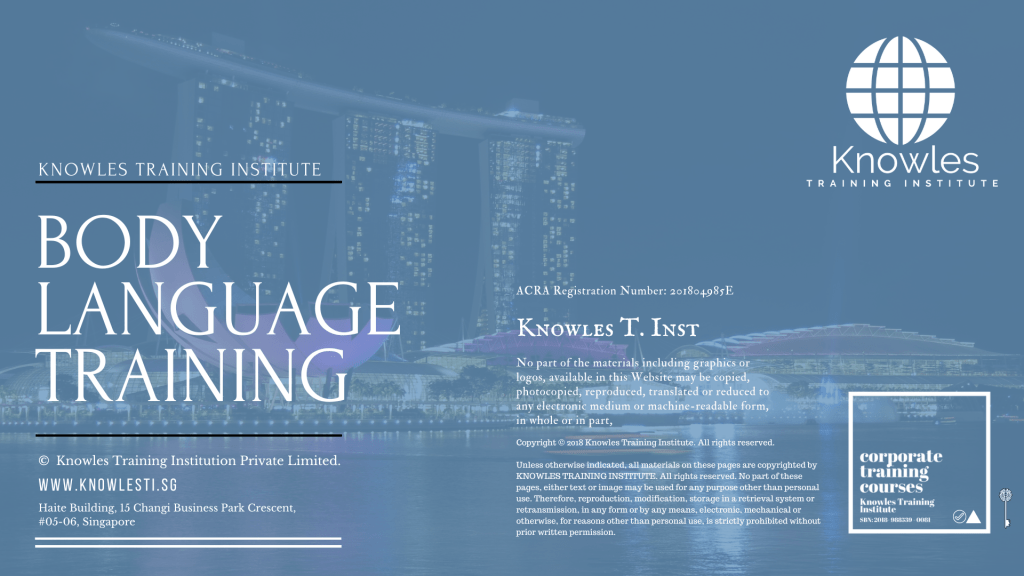
About This Body Language Training Course in India
Body Language Workshop. Body Language Training in India.
Body Language Skills Course in India
Body language is of nonverbal communication in which physical behaviours, as opposed to words, are used to express or convey information. Such action includes facial expressions, body posture, gestures, eye movement, touch and the use of space. Body language is in both animals and humans, but this course also focuses on interpretations of human body language. It is also known as kinesics.
Body language must not be mixed with sign language, assign languages are full languages like spoken languages and have their complex grammar systems, as well as being able to show the basic properties that exist in all languages. On the other hand, Body language does not have a grammar order and must be construed broadly, instead of having an absolute definition corresponding with a particular movement, so it’s not a language like sign language and is termed as a “language” due to popular culture.
In a community, there are agreed-upon ideas of a particular behaviour. Definitions may vary from country to country, or from culture to culture. As a result, there is controversy about whether body language is common. Body language is a subset of nonverbal communication, complements verbal communication in social communication. Researchers conclude that nonverbal communication estimates for the bulk of information transferred during interpersonal interactions. It also helps to establish the relationship between two people and regulates interaction but can be ambiguous.
Who Should Attend This Body Language Skills Course in India Workshop
This Body Language Skills Course in India workshop is ideal for anyone who would like to gain a strong grasp and improve their Body Language Skills.
All Staff Within An Organisation
Managers
Team Leaders
Executives
Assistants
Officers
Secretaries
Group Size For This Body Language Skills Training Program in India
The ideal group size for this Body Language Skills course is:
Minimum: 5 Participants
Maximum: 15 Participants
Course Duration For This Body Language Skills Course in India
The duration of this Body Language Skills Course in India workshop is 2 full day. Knowles Training Institute India will also be able to contextualised this workshop according to different durations; 1 full day, half day, 90 minutes and 60 minutes.
2 Full Days
9 a.m to 5 p.m
Body Language Skills Course in India Benefits
Below is the list of course benefits of our Body Language Skills course in India
Body Language Course in India Benefits- Part 1
- Improving your body language will improve your life
- Become a better communicator
Body Language Course in India Benefits- Part 2
- Improve your presence, be magnetic as soon as you walk into a room
- Prevent conflict from happening by reading subtle cues of defensive or angry body language
Body Language Course in India Benefits- Part 3
- Learn to connect with people better through your body language
- Learn the value of making eye contact
Body Language Course in India Benefits- Part 4
- Recognise when someone’s voice seems uncomfortable
- Make gestures that foster encouragement
Body Language Course in India Benefits- Part 5
- Learn not to make judgemental facial expressions
- Use your space in a way that fosters reliability
Body Language Skills Course in India Objectives
Below is the list of course objectives of our Body Language Skills course in India
Body Language Course in India Objectives – Part 1
- Define Body Language.
- List some of the advantages of interpreting body language.
- Understand that eye contact can make someone seem as if they’re being heard.
- Understand when someone’s facial expressions changes.
Body Language Course in India Objectives – Part 2
- Recognise the different types of gestures individuals use.
- Recognise what it was that made someone’s body language change.
- Learn to interpret the various body language movements.
- Recognise the various types of ‘Power’ handshakes.
Body Language Course in India Objectives – Part 3
- Develop an understanding of why individuals behave in particular physical ways.
- Recognise the common blunders when interpreting body language.
- Understand your body language and what you are communicating.
Course Content For This Body Language Skills Training Course in India
Below is the list of course content of our Body Language Skills training course in India
Body Language Training in India Content- Part 1
We are regularly communicating, even if we are not speaking. Unspoken communication forms over half of what we tell others and vice-versa. It influences our work and personal relationships with others. Individuals can drastically improve their negotiating, management, and interpersonal abilities by accurately reading body language.
- Learning a Body Language is Like Learning a New Language
- In many ways, understanding body language is like learning a foreign language.
- The Power of Body Language: It’s Most Powerful Benefits
- Body language is impartial.
- Body language builds self-awareness.
- Body language improves listening and communication skills.
- More Than Words
- Understand Proximity: The distance separating individuals.
- Understand Positioning: Position of a body
- Understand Facial expression: The eyes are especially noticed.
- Understand Touching: Involves objects, people, and oneself.
- Understand Breathing: The speed of respiration is tell tale sign for many things.
Body Language Training in India Content- Part 2
We are regularly reading the body language of others, even when we are not conscious of it. Actively reading body language does provide valuable insight and improve communication.
- Actions Speak Louder Than Words
- Our opinions of each other are based on more than words.
- All About Head Positions
- Understanding nods.
- Understanding tilting of the head.
- Understanding chin positions.
- Translating Gestures Into Words
- Understanding finger movements
Body Language Training in India Content- Part 3
There are several factors that will produce misleading body language signals. This is why it is crucial to consider the positions and gestures as a whole when trying to read body language.
- Open and Closed Body Language
- Understanding leg positions
- Understanding arm positions.
- The Eyes Have It
- Explain eyes looking to the left vs right.
- Explain Direct eye vs wandering eyes.
- Understanding blinking eyes.
Body Language Training in India Content- Part 4
Posture can lead to improper judgments and preconceptions. Often, poor posture is regarded as a closed body language that individuals assume is induced by a lack of confidence.
- Poor Posture
- Posture can direct to unfair judgments and prejudices
- Invading Personal Space
- Invading personal space is usually seen as an act of hostility. Western societies use five different zones, depending on social circumstances.
- Quick Movements
- Quick movements may be translated as nervousness.
Body Language Training in India Content- Part 5
Most Individuals fidget from time to time. In meetings and social settings, fidgeting can mean nervousness, weariness, disappointment, anxiety or stress.
- Facial Expressions
- Both men and women share general facial expressions, but there are some differences in use and perception.
- Personal Distances
- Personal space and personal distance vary with each individual.
Body Language Training in India Content- Part 6
Not all body language is universal. There are variations in the way that men and women communicate. Body language is often confused among genders. To prevent miscommunications, it is necessary to understand the signs that are typical to most people as well as the various signals that men and women communicate through their body.
- Female Body Language
- There are some distinct differences to perceive when reading female body language. Culture serves a role in what is deemed appropriate body language. Female body language develops over time, and it is not universal to all women. There are, nonetheless, some fundamental actions that many women have in common.
- Male Body Language
- Male body language is not universal to all men. There are, nonetheless, specific characters of body language that are common to many men.
- Common Gestures
- Various gestures that we make are unconscious movements or mannerisms. Being mindful of what our gestures mean will make our understanding of what we are saying more effective.
Body Language Training in India Content- Part 7
We all communicate non-verbally. The image that we extend from our nonverbal communication influences the way that our spoken communication is received. While reading body language is necessary, it is equally essential to understand what your nonverbal communication is informing others. It takes more than words to influence others.
- The Signals You Send to Others
- You are always communicating signals to other individuals. These signals spread through body language, image, voice and even personal distance.
- It is Not What You Say, It Is How You Say It
- Miscommunication is a well-known predicament in both personal and business relations. Paying mindful attention to the way that you communicate will better curb any miscommunications.
- What Your Posture Says
- Posture is the basis of body language communication. People respond well to good posture, and possessing good posture improves physical and emotional health.
Body Language Training in India Content- Part 8
Facial expressions are an essential part of body language. We use our faces to express ourselves, and we all read the facial expressions we see. While some facial expressions are cultural, some facial expressions are universal. Knowing the basics of facial expressions and decoding them will assist you to determine what people are feeling and aid in better communication.
- Facial Expressions are Linked to Emotion
- Many scientists acknowledge the fact that facial expressions are linked to emotions. Different feelings produce physical responses in the body, and facial expressions are emotional responses to situations.
- Micro-expressions
- We all hide negative or undesired emotions from time to time. Emotions can sometimes glide out in the form of micro-expressions. Those brief, involuntary expressions uncover emotions, and they typically last 1/25 of a second.
- Facial Action Coding System (FACS)
- The Facial Action Coding System or FACS is a complex system attributed to Dr. Paul Ekman. This method breaks down the muscle actions of micro-expressions.
Body Language Training in India Content- Part 9
Many facial expressions are absorbed from one’s family and culture. There are, nevertheless, facial expressions that all people are believed to share in common.
- Universal Facial Expressions
- Numerous facial expressions are obtained from one’s family and culture.
- Communicate With Power
- Powerful communication improves confidence and respect. People must sense power without malice. Communicating with power requires practice, but it is effective in the business world.
- Cultural Differences
- While some expressions are universally recognised, various gestures are cultural.
Body Language Training in India Content- Part 10
Body language can give people in business with a key benefit. Fundamental knowledge of body language will increase negotiating strategies and other business-related factors.
- Building Trust With Others
- One should always observe body language to develop trust with business partners. Personal perception builds trust. There are several steps that somebody can take to create a trust or rapport.
- Mirroring
- Mirroring assists in rapport building. Mirroring occurs when we copy the actions and gestures of others to show relations. The perception that people are similar builds trust.
- Watch Their Hands
- We all communicate with our hands, its how you do it that is important to know.
Body Language Training in India Content- Part 11
Body language can reveal deception. Close inspection of body language can indicate that someone is concealing something.
- Forced Smiles
- A forced smile does not normally reach the eyes.
- Eye Contact
- The eyes are described as the “windows to the soul.” The eyes regularly communicate feelings.
- Changes in Posture
- Posture can signal when a person is being deceptive.
Body Language Training in India Content- Part 12
People make quick judgments about each other based on body language. It is conceivable to improve your body language and the way that others perceive you.
- Be Aware of Your Movements
- It is necessary to be mindful of your movements and what they suggest.
- The Power of Confidence
- Improve body language by increasing personal confidence. Everyone has a particular level of confidence that is apparent in body language. There are simple ways that can further improve confidence and body language.
- Position and Posture
- Posture and body position are strong forms of communication.
Body Language Training in India Content- Part 13
The key to inspiring trust is matching body language to the words spoken.
- Practice In a Mirror
- Many individuals have poor body mechanics. They do not realise the mechanics of their posture or positions.
- Involuntary Movements
- Individuals do not have control over their spontaneous movements. Emotions can change our posture, breathing, movements, and micro-expressions.
- Say What You Mean
- Dishonesty may sometimes be part of polite communication.
- Always Be Consistent
- Reliable communication creates trust.
- Actions Will Trump Words
- Most individuals pay more regard to actions than words. We typically make decisions about someone within 4 seconds of a meeting.
Body Language Skills Course in India Value Added Materials
Each participant will receive the following materials for the Body Language Skills course in India
Body Language Skills Course in India Learner’s Guide
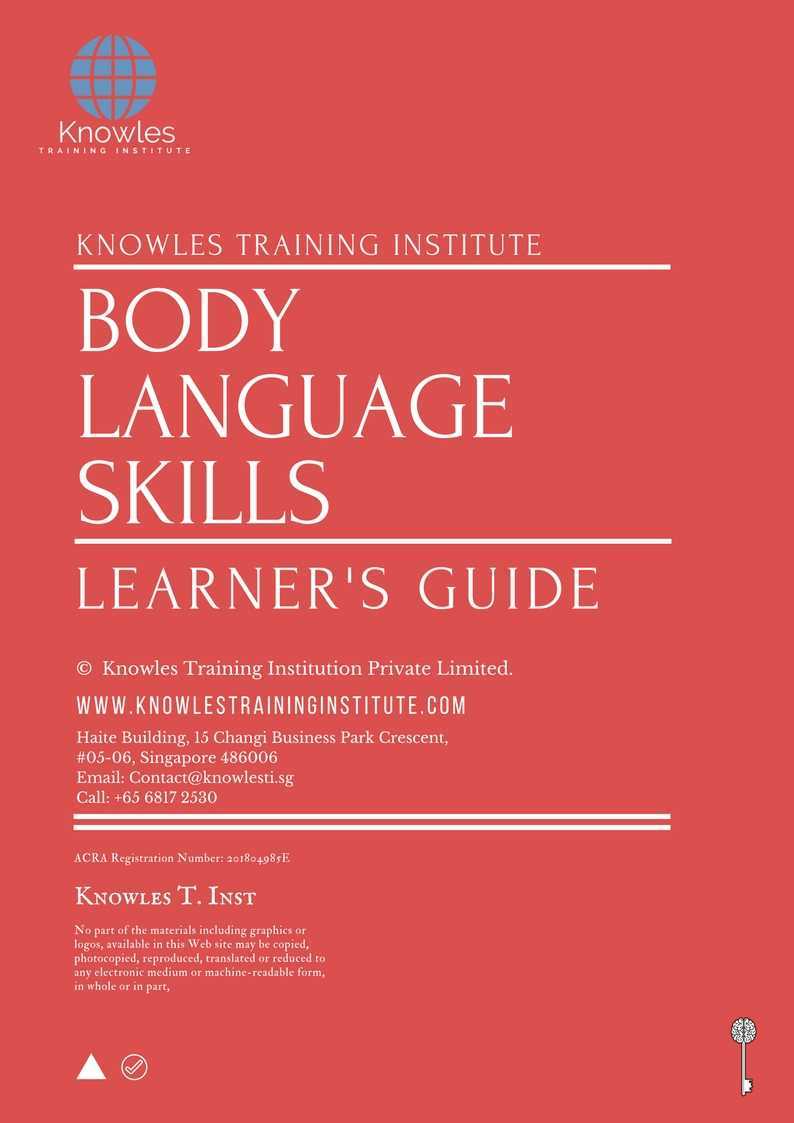
Body Language Skills Course in India Handouts
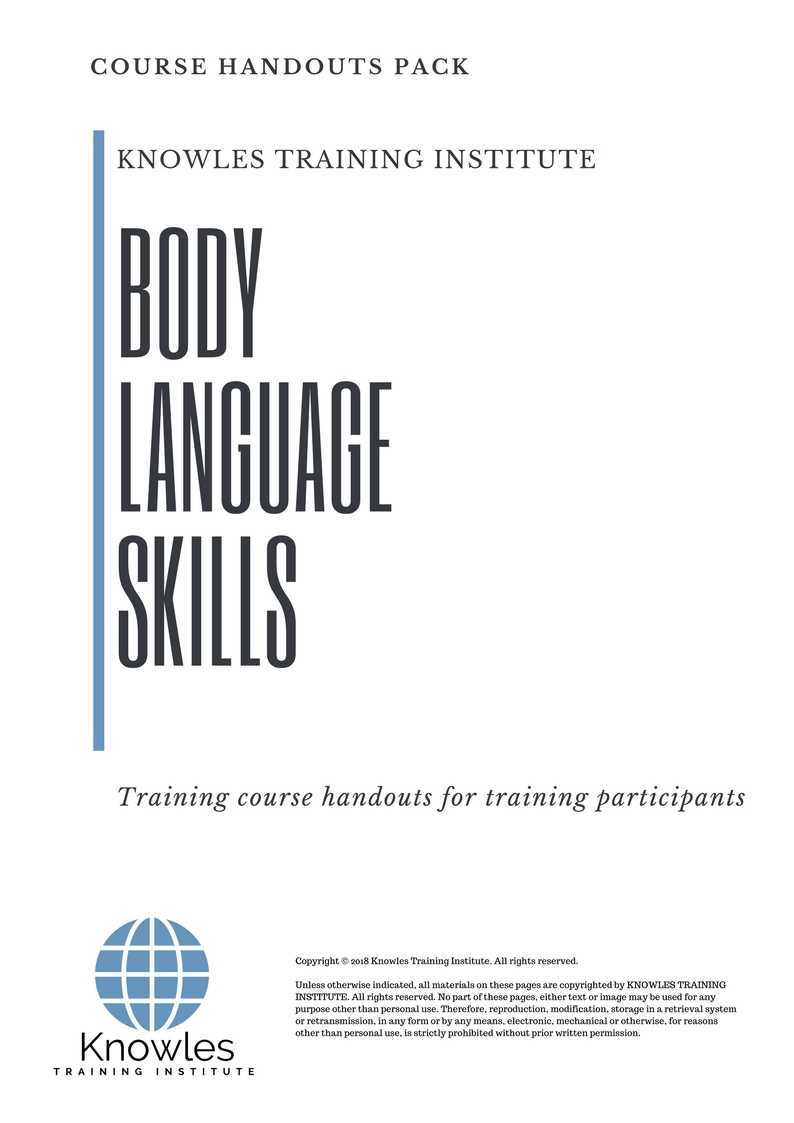
Body Language Skills Course in India PPT Slides Used During Course
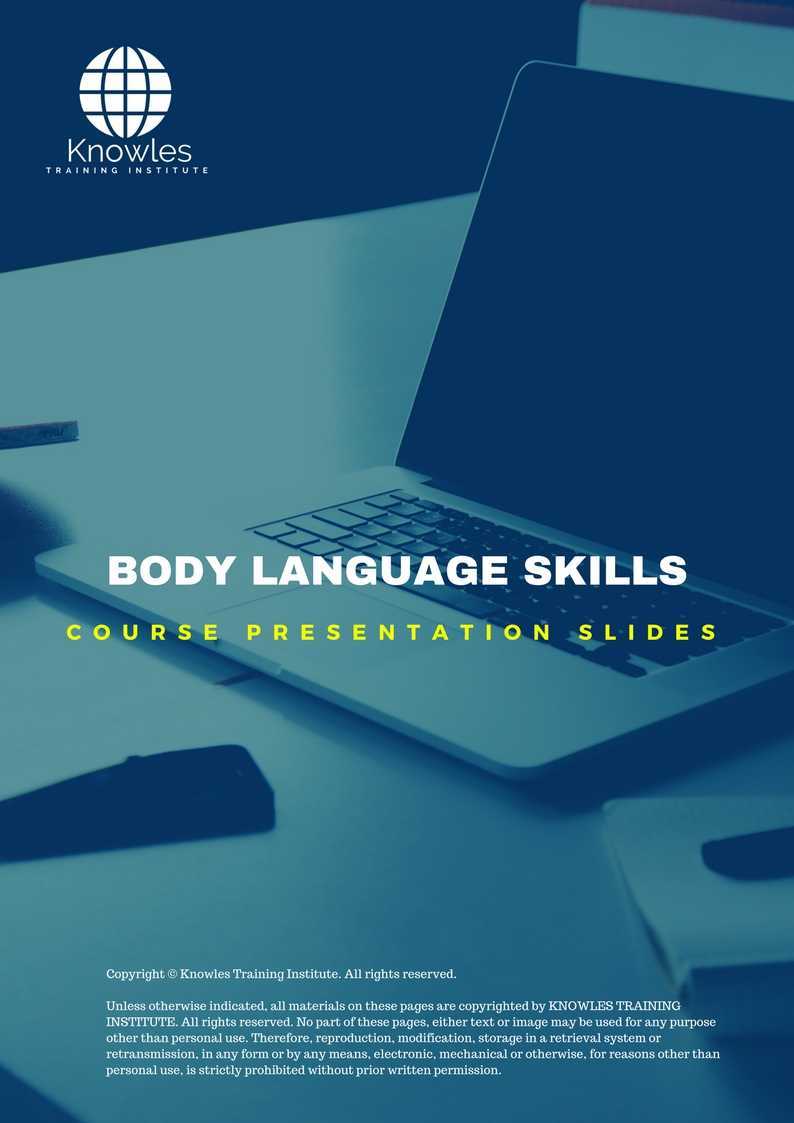
Body Language Skills Course in India Certification
Each course participant will receive a certification of training completion
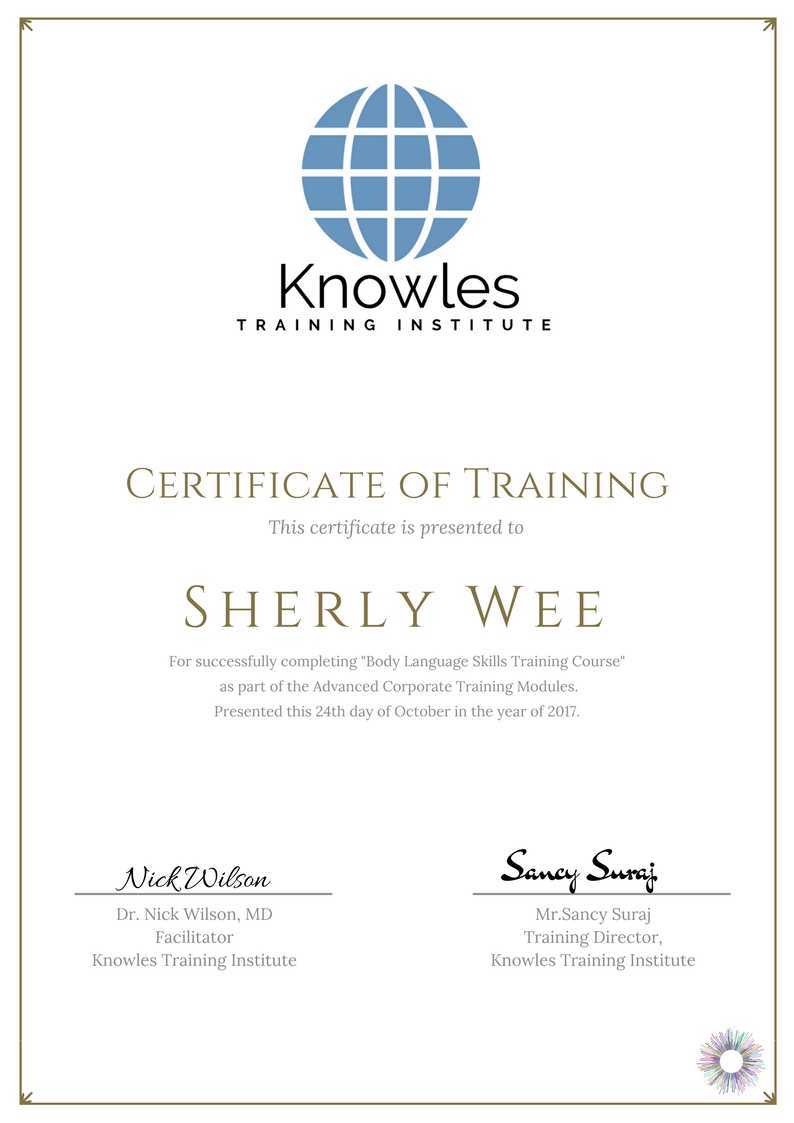
Courses Fees For Body Language Training Course in India
There are 4 pricing options available for this Body Language Skills training course in India. Course participants not in India may choose to sign up for our online Body Language Skills training course in India.
- USD 679.97 For a 60-minute Lunch Talk Session.
- USD 259.97 For a Half Day Course Per Participant.
USD 419.97 For a 1 Day Course Per Participant.
USD 569.97 For a 2 Day Course Per Participant.
Discounts available for more than 2 participants.
Upcoming Body Language Skills Training Course in India Schedule
Contact us for the latest Body language Skills Training course in India schedules:
Email: contact@knowlesti.in
Message:
Download Body Language Course in India Brochure
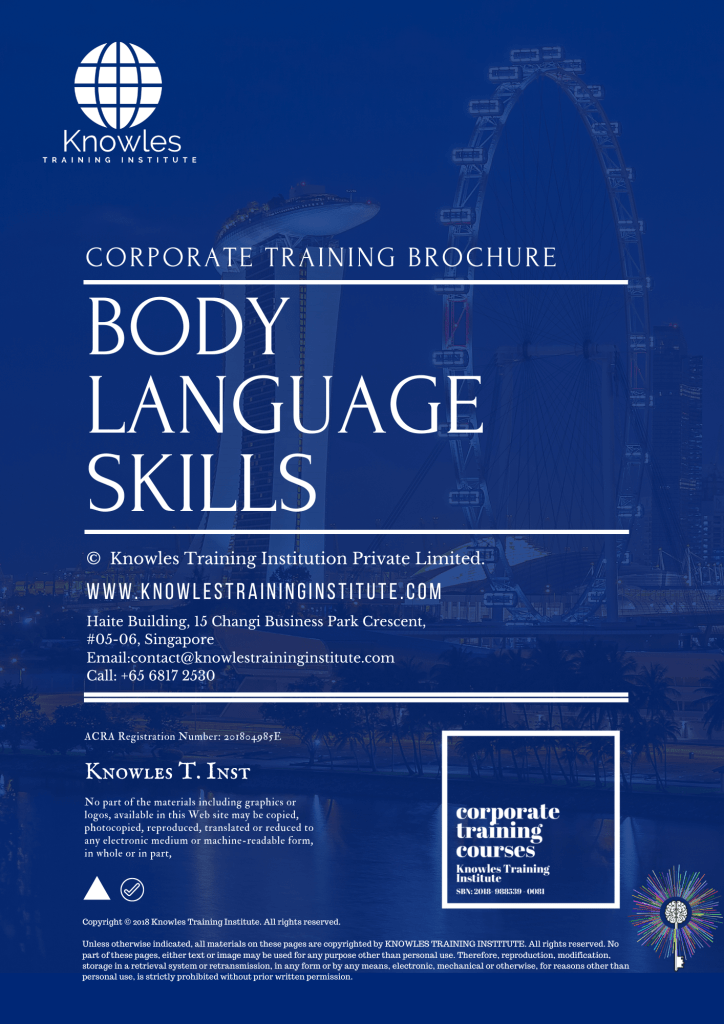
Request for this Body Language course in India brochure. Fill up the short information below and we will send it to you right away!
Post Training Support: A vast majority of training does not have any effect beyond 120 days. To work, training has to have a strong pre- and post-training component. Post-training reinforcement helps individuals to recall the understanding and ask questions.
Blended Learning: Learning does not occur in the classroom. Virtually everybody prefers distinct ways of learning. Successful learning should have a multi-channel, multi-modal strategy.
- We Understand The Industry: We’ve got a profound comprehension of the business, business design, challenges, strategy and the that our participants are in and have designed the courseware to cater to their professional needs.
- Course Content: Knowles Training Institute’s material is relevant, of high quality and provide specific learning results. Participants will leave the training course feeling as they have gained a strong understanding and will also be in a position to execute what they have learned sensibly.
Course Development — The workshop modules follow a systematic and logical arrangement. This structure helps to ensure that the course material allows the facilitators to deliver the course in a logical arrangement. Consider the subjects as building bricks into learning, our facilitators slowly build towards a comprehensive picture of this entire topic.


Contact Us To Register Today!

Fill up the form and we will get back to you in less than 1 working day.
Alternatively, give us a call to have one of our training consultants contact you. Our corporate training courses can be contextualized to meet your organization’s training needs. Leverage on our large pool of professional trainers and consultants for your organization’s training needs.
Email: contact@knowlesti.in
We Guarantee 100% Privacy. We Respect Your Privacy. Your Information Will Never Be Shared.
Body Language Training in India FAQs
What are the 5 types of body language?
The solution to success in your personal and professional ties and connection rests on your abilities to communicate efficiently well. It is not the messages that you choose to deliver, but your nonverbal signs, aka “body language,” that is the most powerful. Body language is the practice of physical expressions, and mannerisms to interact non-verbally, frequently done instinctively rather than consciously.
Types Of Body Language:
- Facial expression
- Body movements and postures
- Gestures
- Eye contact
- Touch
Is Body Language Universal?
Unlike the seven universal facial expressions, body language at this time is not supposed to be universal across all humans. The analysis of body language can differ depending on the culture or country; each can have distinct signals or different meanings. However, if you have ever been in an interaction with a language barrier, you can most of the time, get your underlying message across just by moving your body! The interest in body language is primarily focused on the fact that much of the time, our body is unconsciously sending messages related to our internal states. You may tap your foot if nervously waiting for an essential interview, or clench your fists and jaw if angered. These signals can be picked up if you are trained to see them giving you the advantage of reading others body language. Awareness of body language can also assist you to control your own behaviours, ensuring you put out the correct message or stop you from giving away information that may put you at a loss.
3 Truths of Body Language
- The face is not the best place to start reading body language. – People have learned how to mask their true feelings by the time they are adults. E.g., having to get along with someone you do not get along within a social setting. Your true feelings will not show up on your face.
- Body language shows intent. – Brain research has shown that whatever we are feeling first shows up in our body and then into our conscious minds. To read body language is to learn to understand people’s intents and not their conscious thoughts.
- You are good at reading body language more than you realize. – Think about it. You can pick up cues when someone close to you is ticked off; if your child is bored or if your boss requires something to be done quickly. People that you know can deceive you but not for long.
Why is non-verbal communication important?
Non-verbal signs can provide clues and further information and meaning over the above spoken (verbal) communication. Some estimates suggest around 70-80% of communication is non-verbal.
Non-verbal communication can help you:
- Reinforce or modify spoken words.
- Deliver information about someone’s emotional state.
- Reinforce relationships between people.
- Provide feedback to each other.
- Manage the flow of communication
Why is positive body language important?
Body language is essential as it helps the person to be confident, which will help in assisting in placing their thoughts, feelings, and opinions forward more easily than the others. People tend to get cues from body language; this will help you convey your message garnering more attention and favor in any discussion.
Can you fake body language?
Yes and no.
The vast majority of the general body language can be both practiced or learned. Keeping your hands out of your pockets or using your hands expressively to remain engaging and honest or keeping your hands away from the face can come off as more confident. This is easy to learn and practice which means it could be faked easily. However, a study revealed that there is a full new set of cues that are much more difficult to control, if not impossible.
What are some negative body language?
5 Negative Body Language:
- Closed Gestures: Folding your arms or crossing your legs can give an impression that you are uncomfortable or offended.
- Touching Your Ears: It is said that people touch their ears when they hear something they do not like.
- Scratching The Top Of Your Head: While this is not necessarily a negative sign, this can indicate that you are confused or unsure. This might not be helpful when you are in a meeting with your bosses.
- Standing On One Leg: This will reduce an overall positive first reaction as someone will think you do not care enough to be still.
- Curve Back: This might convey that there is a lack on interest, confidence or lack of motivation.
What are some positive body language?
5 Positive Body Language:
- Eye Contact: This shows that you are interested and engaged in a conversation or situation.
- Affirmative Movements: Nodding your head or smiling can be seen as showing empathy and this can let people see that you are on their side and you are able to identify with their plight.
- Active Hands: Talking with your hands can make you seem more credible and self-assured.
- Open Posture: Relaxed and not slouched. It will make you seem prepared, engaged and serious.
- Feet Pointing: Pointing both your feet towards the person you are speaking to will show that your focus is on them.
How do you make a good first impression on body language?
Make your positive first impression within 7 to 30 seconds of meeting them. It is simpler to make a great first impression as opposed to a negative impression. In order to make a good impression, it will primarily depend upon your body language. Here are a few things you can do:
- Maintain eye contact with the person
- Matching your words with your body language
- Paying attention to your posture
- Avoiding commando postures
- Smile
- Relax
Does body language always tells the truth?
Yes, body language always tells the truth. The problem is, what is it telling the truth about?
While we can consider the social protocols and reading the other person through body language, we need to consider the context. Lying isn’t the only thing that sets off body language. And the other question might be, what is that person hiding or uncomfortable within what they are saying or doing? People on the spectrum, for instance, are going to be uncomfortable with various things in a conversation and can often be thought of as a “liar” when people don’t realize the very use of social protocols is a lie for many on the spectrum.
How do you benefit from body language?
3 Benefits Of Body Language
- Better connect with people: Body language helps you connect better with others as it allows you to expand your communication abilities.
- Preventing conflict: When we can identify negative body language for people, it would help us address arising issues before it escalates.
- Improve your presence: By being aware of the signal you are sending out, you can figure out how people perceive you.
How can body language improve communication?
Non-verbal communication represents an essential role in conjunction with verbal communication. Our non-verbal communication can reiterate, contradict, reinforce, substitute, and complement the meaning of our message. Since non-verbal communication can either highlight our point or contradict it, it is crucial to keep our body language in sync with our news. Any sign of contradiction between the body language and our words can make us appear unreliable and deceptive.
How do you overcome inappropriate body language?
Words make up a small part of communication. The remaining lies in your body language. With a little mindful effort to enhance your body language, you stand a higher likelihood of being seen as the engaging and honest person that you are. Here are some ways you can overcome inappropriate body language.
- Be more mindful
- Be aware of where your hands are
- Mirror the other person
- Face your conversation partner
- Do not fidget
- Do not slouch
- Do not tilt your head
- Relax!
How can I be confident in body language?
If you do not feel confident, practicing body language can boost your self-esteem and make you feel better. Here are 5 (five) tips to increase your confidence through body language.
- Maintain eye contact at least 70% of the time while speaking with them
- Lean forward when you are in conversation. This indicates interest and attention.
- Do not slouch!
- Avoid putting your hands in your pocket to look more self-assured.
- Take longer strides when walking. Confident people take large steps with firmness to showcase authority
What is open body language?
Openness starts with the face. Their eyes are open wide and focused on you. Next, their torso is facing you rather than away. Their hands are open, palms are free, and they are faced towards you, and their body is exposed and not protected by their hands or arms.
Finally, look at the person’s legs and feet. Their feet can either be pointed toward you and not away from you.
How do you read body language?
Body language can reveal what a person is thinking. We are able to tell by their eye behavior to the direction of where their feet are pointed to. Here are 3 (three) common cues.
- Study the eyes: If a person looks away or has a hard time keeping eye contact, this can indicate boredom, disinterest, nervousness or submissiveness.
- Proximity: This refers to the distance that is between you and the other person. Seeing how close someone is standing or sitting next to you can help determine how they view you favorably.
- Their feet: While people are focused on managing their facial expressions, important clues can be revealed through their feet. Where their feet points is where they want to go.
What do you call a person who can read body language?
Kinesics is the study of body motion communication. Birdwhistell defined kinesics as “the study of body‐motion as related to the non‐verbal aspects of interpersonal communication”. He believes body‐motion communication to be systemic, socially learned, and communicative behaviour unless proven otherwise.
Can body language be used as evidence?
Body language can help decide whether witnesses are telling the truth, even when they are speaking in a different language. Necessarily, body language can confirm or contradict the verbal statements of a person testifying in court.


